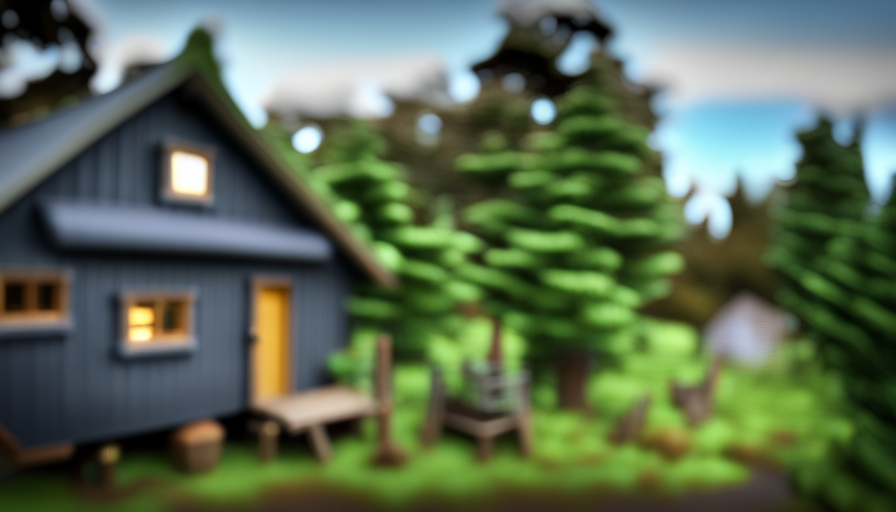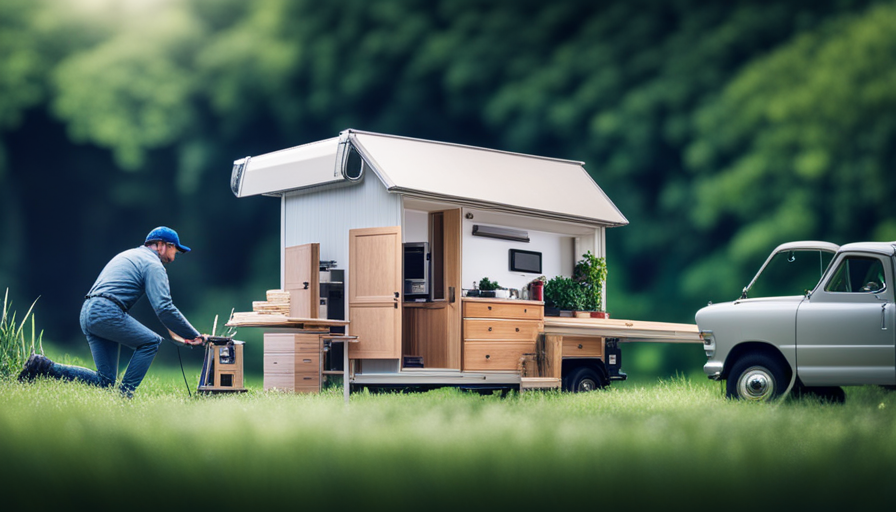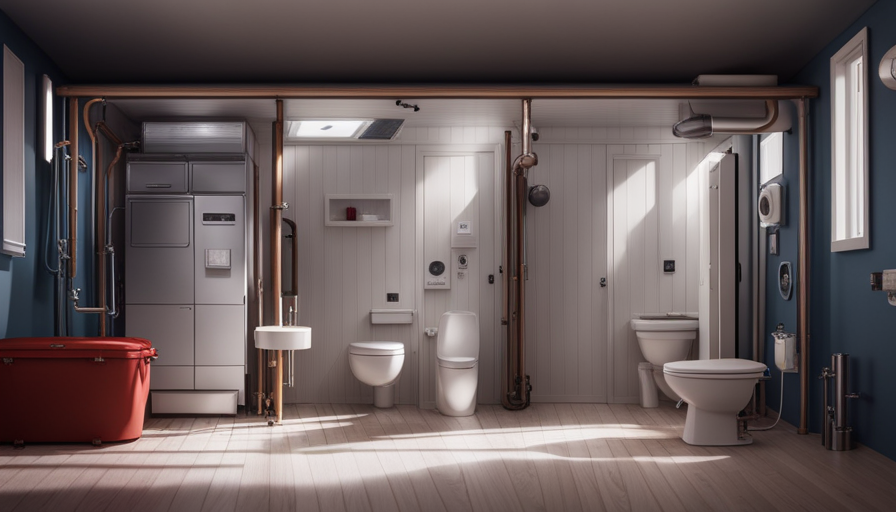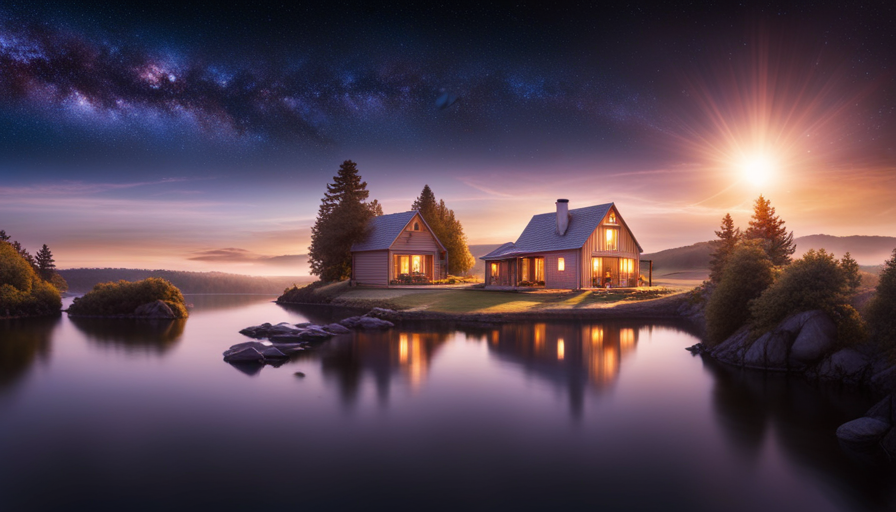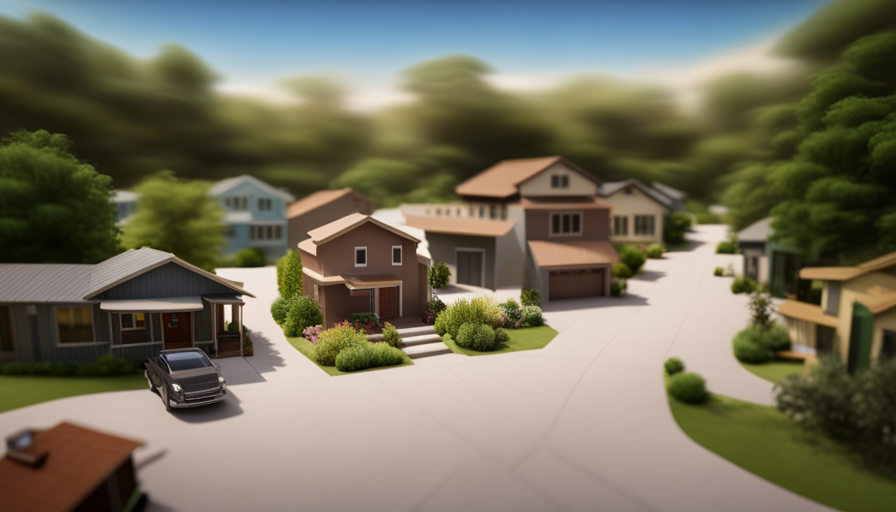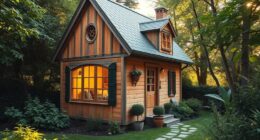Imagine beginning your day in the breathtaking beauty of the Pacific Northwest, surrounded by majestic mountains, lush forests, and peaceful lakes. Picture yourself stepping out of your cozy, well-designed home that perfectly fits your individual needs and lifestyle. This is the appeal of living in a small house in Washington State.
With its diverse landscapes and thriving communities, the opportunities for placing your tiny abode are countless. Whether you desire the vibrant energy of urban areas like Seattle, Tacoma, or Spokane, or crave the tranquility of rural regions such as the Olympic Peninsula, Eastern Washington, or Columbia River Gorge, there is a place for you.
Additionally, if you seek a sense of community, you can explore tiny house communities in Orting, Bellingham, or Olympia. For those who prefer a more temporary dwelling, RV parks and campgrounds are an ideal choice. Lastly, if you’re the adventurous type, Washington State boasts several THOW-friendly counties where you can park your tiny house on wheels.
In this article, we will explore all these options and guide you on where you can put your dream tiny house in Washington State.
Key Takeaways
- Washington State offers diverse landscapes and scenic surroundings for tiny house living.
- Urban areas like Seattle, Tacoma, and Spokane provide convenience and cultural experiences for tiny house enthusiasts.
- Rural areas such as the Olympic Peninsula, Eastern Washington, and Columbia River Gorge offer peaceful and scenic surroundings for sustainable living and off-grid options.
- Washington State has various options for placing your tiny house, including backyard ADUs, RV parks and campgrounds, vacation rentals, and dedicated tiny house communities.
Urban Areas: Seattle, Tacoma, and Spokane
If you’re looking to live a minimalist lifestyle with a touch of urban charm, you’ll find plenty of opportunities to park your tiny house in vibrant cities like Seattle, Tacoma, and Spokane. These urban areas offer a unique blend of convenience and cultural experiences for tiny house enthusiasts.
In Seattle, for example, you can explore urban gardening options and join the thriving community of green thumbs. Tacoma has its own set of tiny house regulations that allow for creative and sustainable living arrangements. Spokane, on the other hand, boasts a growing tiny house movement with various neighborhoods embracing the concept.
Now, let’s shift our focus to the rural areas: Olympic Peninsula, Eastern Washington, and the Columbia River Gorge, where nature takes center stage and tranquility awaits.
Rural Areas: Olympic Peninsula, Eastern Washington, and Columbia River Gorge
Living in rural areas in Washington state, such as the Olympic Peninsula, Eastern Washington, and Columbia River Gorge, offers a peaceful and scenic surrounding that is hard to beat. Surrounded by mountains, forests, and breathtaking landscapes, these areas provide the perfect escape from the hustle and bustle of city life.
In addition, these regions offer ample opportunities for sustainable living and off-grid options, allowing individuals to live in harmony with nature and reduce their carbon footprint. Whether it’s growing your own food, harnessing renewable energy sources, or exploring eco-friendly alternatives, these rural areas in Washington state provide a haven for those seeking a more sustainable way of life.
Peaceful and scenic surroundings
Imagine waking up each morning to breathtaking views of mountains and lakes as you sip your coffee from the front porch of your tiny house. It’s nestled in the serene and picturesque surroundings of Washington State.
Washington offers numerous scenic retreats and nature getaways where you can place your tiny house and immerse yourself in the beauty of nature. From the stunning Olympic Peninsula with its lush rainforests and dramatic coastline, to the rugged landscapes of Eastern Washington with its rolling hills and vast open spaces, and the awe-inspiring Columbia River Gorge with its towering cliffs and cascading waterfalls, there are endless options for finding peaceful and scenic surroundings for your tiny house.
And the best part? These locations not only provide a tranquil escape but also offer opportunities for sustainable living and off-grid options, allowing you to live in harmony with the environment.
Opportunities for sustainable living and off-grid options
Embrace the chance to live sustainably and off the grid in Washington’s scenic surroundings, where you can experience the harmonious rhythm of nature and reduce your ecological footprint.
Washington State offers a myriad of opportunities for sustainable living, with an abundance of sustainable building materials and innovative off-grid power solutions. When building your tiny house in Washington, you can utilize materials such as reclaimed wood, recycled metal, and sustainable insulation to minimize your environmental impact.
Additionally, there are various off-grid power options available, including solar panels, wind turbines, and hydroelectric systems, allowing you to generate your own clean energy. Living off-grid in Washington gives you the freedom to disconnect from traditional utilities and live a more self-sufficient lifestyle.
Transitioning into the subsequent section about ‘tiny house communities: Orting, Bellingham, and Olympia,’ you’ll find that these communities also embrace sustainable living practices and offer a supportive environment for tiny house enthusiasts.
Tiny House Communities: Orting, Bellingham, and Olympia
If you’re looking for a place to park your tiny house in Washington State, consider Orting, Bellingham, or Olympia for vibrant communities that welcome tiny house living. These cities have embraced the tiny house movement and have specific regulations and zoning restrictions in place to accommodate them.
In Orting, for example, they have a specific tiny house zoning code that allows for the establishment of tiny house communities. Bellingham has also implemented regulations that allow for tiny houses on wheels, making it easier for people to live sustainably and off-grid.
Olympia, on the other hand, has a variety of options for tiny house living, including communities and backyards. Speaking of backyard ADUs (Accessory Dwelling Units), these can be a great alternative for those who want to live in a tiny house but may not have access to a tiny house community. With backyard ADUs, you can have your own private space while still being part of a larger community.
Backyard ADUs (Accessory Dwelling Units)
Create your own little oasis with a backyard ADU, a hidden gem that allows you to plant the seeds of community and watch them bloom.
Backyard ADUs, also known as Accessory Dwelling Units, are a popular option for tiny house enthusiasts in Washington State. These units are small, standalone dwellings that can be built in the backyard of an existing home. They provide an affordable housing solution and offer the opportunity to create a sense of community within your own property.
To help you navigate the process, here are four key points to consider about backyard ADUs in Washington State:
-
Backyard ADU regulations: Before starting your project, it’s important to familiarize yourself with the local regulations and zoning requirements for building a backyard ADU. Each city may have its own specific rules, so be sure to do your research and comply with all necessary permits and codes.
-
Financing options: Building a backyard ADU can be a significant investment. However, there are various financing options available, such as loans, grants, and tax incentives. Researching these options can help you find the best financial solution for your backyard ADU project.
-
Design considerations: When planning your backyard ADU, consider the design and layout that will best suit your needs. Think about the space requirements, amenities, and functionality you desire. Working with a professional architect or designer can help you create a space that maximizes both comfort and practicality.
-
Community engagement: Backyard ADUs offer a unique opportunity to foster a sense of community within your property. Consider ways to engage with your neighbors, such as hosting gatherings or creating shared outdoor spaces. Building relationships and connecting with others can bring immense joy and support to your tiny house journey.
As you explore the possibilities of backyard ADUs, it’s important to note that Washington State also offers other options for placing your tiny house, such as RV parks and campgrounds. These locations provide additional opportunities for living in a tiny house and experiencing the beauty of nature.
RV Parks and Campgrounds
RV parks and campgrounds are great options for temporary or seasonal living in a tiny house in Washington State. These parks offer a range of amenities and services that cater to the needs of tiny house owners.
From full hookups for water, electricity, and sewer, to recreational facilities such as swimming pools and playgrounds, RV parks and campgrounds provide a comfortable and convenient living experience for those looking to live in their tiny homes on a temporary basis.
Temporary or seasonal living options
There are plenty of charming locations in Washington State where you can place a tiny house for temporary or seasonal living. If you’re looking for temporary housing options, there are vacation rentals available throughout the state that allow you to experience the beauty of Washington while staying in a tiny house.
These rentals often provide all the amenities you need for a comfortable stay, such as a kitchen, bathroom, and sleeping quarters. Additionally, many of these vacation rentals are located in picturesque areas, allowing you to enjoy the natural surroundings and outdoor activities that Washington has to offer.
When it comes to amenities and services available for tiny house owners, there are various options depending on the location you choose. From RV parks with hookups to private land rentals with access to utilities, you can find a place that suits your needs and preferences.
Amenities and services available for tiny house owners
If you’re lucky enough to find a picturesque location for your tiny abode in Washington, the amenities and services available will make you feel like you’re living in a luxurious resort.
The tiny house movement has gained significant community support in Washington, and as a result, many areas offer dedicated tiny house communities with a range of amenities. These communities often provide shared spaces for socializing, such as community centers, parks, and gardens, fostering a strong sense of belonging.
Additionally, some communities offer support services like workshops and classes on sustainable living and tiny house maintenance. It’s important to note that while Washington State has relatively lenient zoning regulations for tiny houses, it’s still essential to research and comply with local laws and restrictions.
Understanding these regulations will ensure a smooth and legal transition into the subsequent section about ‘tiny house on wheels (thow) friendly counties’.
Tiny House on Wheels (THOW) Friendly Counties
Explore the majestic counties of Washington State that warmly embrace and welcome your tiny house on wheels, allowing you to fulfill your dream of a simpler, more nomadic life.
Whether you prefer the urban vibe or the tranquility of rural areas, there are counties in Washington that have favorable zoning regulations for Tiny Houses on Wheels (THOWs). King County, home to bustling Seattle, has embraced the tiny house movement by allowing THOWs in certain residential zones.
Additionally, Whatcom County, located in the beautiful Pacific Northwest, permits THOWs in both urban and rural areas. If you’re seeking a more rural setting, Mason County is another great option, with its flexibility in zoning regulations for THOWs.
These counties offer a variety of amenities and services while providing a welcoming environment for tiny house owners looking to embrace a simpler lifestyle.
Frequently Asked Questions
Are there any restrictions or regulations for placing a tiny house in Seattle, Tacoma, or Spokane?
Tiny house regulations in Seattle, Tacoma, and Spokane: what you need to know.
There are specific regulations for placing a tiny house in each of these cities.
In Seattle, you can park your tiny house on wheels in designated RV parks or on private property with proper permits.
Tacoma allows tiny houses on wheels in residential zones as long as they meet certain requirements.
Spokane allows tiny houses on wheels as accessory dwelling units on residential properties.
It’s important to research and comply with local zoning and building codes before placing your tiny house.
What are the zoning laws for placing a tiny house in the Olympic Peninsula, Eastern Washington, and Columbia River Gorge?
Zoning laws for tiny houses in Washington State can be a real buzzkill. Understanding these regulations and restrictions is like navigating a maze of paperwork and red tape. But fear not, my fellow tiny house enthusiasts!
In the Olympic Peninsula, Eastern Washington, and the Columbia River Gorge, you’ll need to do some serious research to find suitable locations. Keep in mind factors like minimum lot size, setback requirements, and whether the area is zoned for residential or recreational use.
Happy hunting!
Are there any specific tiny house communities in Orting, Bellingham, and Olympia?
There are specific tiny house communities in Orting, Bellingham, and Olympia. Living in a tiny house community has numerous benefits.
These communities provide a sense of belonging and support, as well as opportunities for social interaction and shared resources. Residents can enjoy a simpler, more sustainable lifestyle while still having access to amenities and services.
Tiny house communities also offer a unique sense of community and a chance to connect with like-minded individuals.
Can I legally place a tiny house in my backyard as an accessory dwelling unit (ADU)?
You can legally place a tiny house in your backyard as an accessory dwelling unit (ADU) in Washington State. It’s important to note that ADU regulations vary by city and county, so it’s crucial to check local zoning ordinances.
One interesting statistic is that according to a survey by the American Tiny House Association, 53% of tiny house owners use their tiny homes as home offices or studio spaces. Additionally, some cities do allow renting out tiny houses on platforms like Airbnb, but again, it’s crucial to verify local regulations.
Are there any RV parks or campgrounds in Washington State that allow tiny houses?
Yes, there are several RV parks and campgrounds in Washington State that allow tiny houses. These places provide a great option for individuals looking to live in a tiny house while enjoying the amenities and community of an RV park or campground.
It’s important to note that before parking your tiny house in these locations, it’s crucial to check with the specific park or campground regarding their regulations and any additional requirements they may have.
Conclusion
In conclusion, Washington State offers a variety of options for placing a tiny house. Whether you prefer the bustling urban areas of Seattle, Tacoma, or Spokane, the peaceful rural areas of Olympic Peninsula, Eastern Washington, or Columbia River Gorge, or the tight-knit communities of Orting, Bellingham, and Olympia, there is a place for you.
Additionally, backyard ADUs and RV parks/campgrounds provide alternative options. Interestingly, according to a recent survey, the number of tiny house communities in Washington State has increased by 20% in the past year, highlighting the growing popularity of this housing trend.
